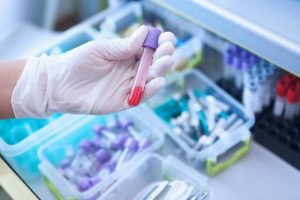With the increasing number of older births in Japan, “prenatal diagnosis” is now attracting much attention. However, you may be saying, “I don't know what kind of test and when it can be done. Today, we will provide you with the knowledge to answer that question.
What is Prenatal Diagnosis?
Prenatal diagnosis is a test to determine what conditions a baby may have before birth.
There are two types of this prenatal diagnosis: ‘Non-definitive’ and ‘Definitive’ tests.

Types of Prenatal Diagnosis and When to Undergo
Non-Definitive Tests
A ‘non-definitive test’ is a test that involves minimal risk of pain or danger to the mother or the baby.
However, if the test results come back positive, a definitive test must be performed to confirm the diagnosis. There are four types of non-definitive tests:
Ultrasound Examination (Echography)
Ultrasound examinations use ultrasound waves to examine the baby in the abdomen for congenital abnormalities.
As in a normal pregnancy examination, an ultrasound is placed on the mother’s belly to produce an image of the baby’s body.
Therefore, there is no risk of miscarriage. And there are two types of this ultrasound examination:
Ultrasound examination at Antenatal checkup ( Normal Ultrasound Examination)
This is the examination method performed during a normal pregnancy checkup.
It is performed to check the growth and development of the baby and detect possible fetal diseases based on the thickness of the cervical spine and the development of the baby.
The cost of the examination is about ¥2,000 and can be undergone from the early stages of pregnancy (5-6 weeks).
Since this examination is performed in combination with a prenatal checkup, the cost may vary among OB/GYNs.
Fetal Dock (Fetal Anomaly Scan)
It refers to a precise ultrasound examination to examine changes in the morphology and function of the internal organs (e.g., heart) of the baby.
Due to the precision of the ultrasound equipment, only a limited number of medical institutions are able to provide this test.
However, since this test can only reveal the ‘possibility’ of chromosomal changes in the fetus, etc., a definitive test is necessary to confirm the diagnosis.
The cost of the test is about ¥10,000 to ¥20,000 and can be taken in early pregnancy (10 to 13 weeks), mid pregnancy (18 to 20 weeks), and late pregnancy (28 to 30 weeks).
Maternal Serum Marker Test (Quattro Test)
Maternal Serum Marker Test (Quattro Test) is a test that examines the components of blood drawn from the mother.
It calculates the probability of chromosomal changes and open neural tube defects in the fetus.
Open neural tube defects include Spina bifida (a disease in which part of the spinal column does not form normally) and Anencephaly (a disease in which the brain does not develop).
While this test requires only a blood sample and is less harmful to the mother, it has the disadvantage that the mother’s age, weight, number of weeks of pregnancy, and family history can affect the probability, and accurate results cannot be verified until a definitive test is performed.
The cost of the test is about ¥20,000 to ¥50,000 and can be taken around the 15th to 17th week of pregnancy.
Combined Examination
Combined testing, called a combination test, combines two tests: a precision ultrasound and a serum marker test, which examines blood components drawn from the mother.
Although it is considered more accurate than ultrasound alone or maternal serum marker test alone, the results are indicated as probabilities and is only a non-definitive test, so a definitive test is required to make a definitive diagnosis.
The cost of the test is about ¥30,000 to ¥50,000 and can be taken between the 11th and 13th week of pregnancy.
NIPT (Non-invasive Prenatal Testing)
NIPT is an abbreviation for Non-invasive Prenatal Testing, is a screening test that began in Japan in 2013. It is a screening test that examines the baby’s chromosomal abnormalities by assessing the amount of fetal DNA contained in blood samples taken from the mother. Typical diseases that can be detected by NIPT (Non-invasive Prenatal Testing) include chromosomal abnormalities such as Down syndrome (Trisomy 21), Edwards syndrome (Trisomy 18), and Patau syndrome (Trisomy 13)in the fetus.
It is a non-definitive test that can be performed only using blood samples from the mother, and is distinguished by its extremely high accuracy. The cost of the test is approximately ¥200,000, and the test can be taken starting at 10 weeks of pregnancy.
Definitive Tests
A ‘definitive test’ is when a positive non-definitive test is followed by a more precise test to confirm the diagnosis.
However, definitive testing involves risks compared to non-definitive testing, such as pain during the test and the risk of miscarriage or stillbirth. It is also important to note that a definitive test cannot be performed at any number of weeks, and there is a certain number of weeks that is appropriate for the test.
Definitive testing includes the following two methods:
Chorionic Villus Test
This test is performed by directly inserting a needle into the mother’s belly at around the 11th to 14th week of pregnancy to collect trophoblast cells to examine DNA and chromosome changes in the fetus.
In addition to the stress on the mother, there are complications such as miscarriage, hemorrhage, water breaking, abdominal pain, and injury to the fetus, with a risk of miscarriage of about 1% (1 in every 100 pregnant women).
The cost of the test is about ¥100,000 to ¥200,000 and can be performed between the 11th to 14th week of pregnancy.
Amniotic Fluid Test
This test is performed after 15-16 weeks of pregnancy by inserting a needle directly into the mother’s belly and extracting fetal cells from amniotic fluid to examine fetal DNA and chromosome changes.
Similar to the chorionic villus examination, the complications include miscarriage, as well as causing burden/stress to the mother.
However, the probability of miscarriage is lower than that of the chorionic villus test, about 0.3% (1/300). Compared to the chorionic villus test, many people choose the amniotic fluid test for definitive testing because of the relative ease of the procedure and the later date when the test is possible to perform.
The cost of the test is about ¥100,000 to ¥200,000 and can be taken at around the 15th to 18th week of pregnancy.
Causes of Congenital Diseases
The percentage of babies born with congenital diseases is estimated to be about 3-5% from total births.
A question that arises here is why do congenital diseases such as intellectual disabilities occur in the first place?
The causes of most congenital diseases are unknown, but infectious factors, genetic factors, and certain environmental factors are said to increase the risk of developing congenital abnormalities.
Genetics and Chromosome Factors
It is due to abnormalities in chromosomes and genes.
These abnormalities are inherited from both parents, and the parents themselves may be affected by the abnormality, or the parents may not have the abnormality but may carry an abnormal gene that causes a particular disease.
However, many birth defects are caused by chromosomal abnormalities or genetic mutations in the baby.
Congenital abnormalities caused by genetic factors are often not limited to obvious malformations in one area of the body, but can affect other parts of the body as well.
Environmental factors and toxic substances (Teratogens) Factors
Teratogens are substances that cause or increase the possibility of birth defects.
Teratogens include radiation (including X-rays), various specific drugs, toxic substances (including alcohol), and tobacco.
Maternal Age
The older the mother, the higher the probability of chromosomal abnormalities and other birth defects. In other words, the older the mother is, the greater the risk that her baby will develop a congenital disease.
The Japanese Society of Obstetricians and Gynecologists has tabulated the relationship between maternal age and births with congenital abnormalities. The following results show that the probability of birth of a child with congenital abnormalities increases with maternal age over 40 years old.
Reference:Japanese Society of Obstetricians and Gynecologists –
Maternal Age (Years) ~19 20~24 25~29 30~34 35~39 40~ Birth Rate of Children with Congenital Abnormalities (%) 2.80 2.42 2.26 2.34 2.54 3.27
先天異常モニタリング調査 外表奇形等統計調査報告書
Furthermore, the maternal age and the detection rate of chromosome abnormalities show no significant increase in sex chromosome abnormalities, which are related to male and female gender.
However, autosomes, which are present in everyone, and is where chromosome abnormalities usually occur, will begin to increase rapidly around the age of 40.
We will take a closer look at three chromosomal abnormalities and maternal age that can be examined by NIPT (Non-invasive Prenatal Testing): Trisomy 21 (Down syndrome), Trisomy 18 (Edwards syndrome), and Trisomy 13 (Patau syndrome).
Reference: Japan Society of Obstetrics and Gynecology – 専攻医教育プログラム2 出生前診断
Maternal Age (At Birth) Down Syndrome Trisomy 18 Trisomy 13 20 1/1441 1/10000 1/14300 25 1/1383 1/8300 1/12500 30 1/959 1/7200 1/11100 35 1/338 1/3600 1/5300 36 1/259 1/2700 1/4000 37 1/201 1/2000 1/3100 38 1/162 1/1500 1/2400 39 1/113 1/1000 1/1800 40 1/84 1/740 1/1400 41 1/69 1/530 1/1200 42 1/52 1/400 1/970 43 1/37 1/310 1/840
The occurrence of chromosomal abnormalities increases dramatically when the maternal age at birth exceeds the 30-year mark. For Down syndrome, births at age 43 are approximately 38 times more likely to result in Down syndrome than births at age 20; Trisomy 18 is approximately 32 times more likely, and Trisomy 13 is 17 times more likely, these data show.

NIPT (Non-invasive Prenatal Testing) at Hiro Clinic NIPT
How Early and Until When Can I take NIPT (Non-invasive Prenatal Testing) at Hiro Clinic NIPT?
At Hiro Clinic NIPT, anyone who is at least 10 weeks pregnant or later can take the test. In response to the requests of pregnant women who want to know the condition of their babies, we do not set any age limit for mothers.
If the result of NIPT (Non-invasive Prenatal Testing) is positive and you wish to have an amniotic fluid test as a definitive test, we recommend that you have it done by the 14th week of pregnancy.
What you can discover from NIPT (Non-invasive Prenatal Testing) at Hiro Clinic NIPT
The following chromosomal abnormalities can be detected by NIPT (Non-invasive Prenatal Testing) at Hiro Clinic NIPT:
| Trisomy 21 (Down Syndrome) Trisomy 18 (Edward Syndrome) Trisomy 13 (Patau Syndrome) Aneuploidy of All Autosomes Sex chromosome Aneuploidy Klinefelter’s Syndrome Turner Syndrome XXX Syndrome XYY Syndrome Gender Determination/Identification Whole Autosomal Whole Region Partial Deletion/Duplication Disease |
NIPT (Non-invasive Prenatal Testing) is distinguished by its high accuracy in detecting diseases caused by changes in the number of chromosomes, such as Trisomy 21 (Down Syndrome), Trisomy 18 (Edward Syndrome), and Trisomy 13 (Patau Syndrome).
NIPT (Non-invasive Prenatal Testing) is a test that has a high probability (positive predictive rate) if the result is positive, the baby will indeed have a chromosomal abnormality. However, as one example, the positive predictive rate for Trisomy 21 (Down Syndrome) is 95.5%, and about 4% of babies with a positive NIPT (Non-invasive Prenatal Testing) may be born without chromosomal abnormalities.
If NIPT (Non-invasive Prenatal Testing) is positive, amniotic fluid testing is recommended for a definitive diagnosis.
NIPT (Non-invasive Prenatal Testing) Cost at Hiro Clinic NIPT
The cost of the NIPT (Non-invasive Prenatal Testing) varies from medical institution to medical institution, ranging from ¥150,000 to ¥200,000.
At Hiro Clinic NIPT, we offer a variety of plans, allowing mothers and fathers to choose the test that best suits their needs and their risk of chromosomal abnormalities.
For those who want to be tested for Down Syndrome only, we offer the ‘Down Syndrome Stand-alone Plan‘ for ¥49,500, including tax. This plan tests for abnormalities in the number of chromosome 21. For those who wish to be tested for only one type of disorder, like Trisomy 18 (Edward Syndrome) or Trisomy 13 (Patau Syndrome), you can be tested for them with the Down Syndrome Stand-alone Plan.
However, the Japanese Society of Obstetrics and Gynecology recommends simultaneous testing for all three types of trisomy: Trisomy 21 (Down Syndrome), Trisomy 18 (Edward Syndrome), and Trisomy 13 (Patau Syndrome).
Hiro Clinic NIPT also offers a ‘Minimum Plan‘ for trisomy 21, 18, 13 for ¥99,000 including tax.
In addition, we offer a variety of other plans, including:
- Light Plan
This plan adds a sex chromosome (abnormality in number) test to the Minimum Plan. The cost of this plan is ¥132,000 (tax included). - over35 Plan
This plan allows testing for all trisomies/monosomies 1 to 22, which are more likely to occur in pregnant women over 35 years of age. The cost of this plan is ¥165,000 (tax included). - Junior Plan
This plan includes testing for chromosomes 21, 18, and 13 plus trisomy/monosomy of sex chromosomes, as well as partial deletion and duplication disease abnormalities in all regions of chromosomes 1, 2, 3, 4, 5, 7, 8, 10, 15, 18, 20, 21, and 22. The cost of this plan is ¥187,000 (tax included). - Recommended Plan
This plan includes testing for chromosomes 1-22 + trisomy/monosomy of sex chromosomes, plus partial deletion and duplication of all regions on chromosomes 1, 2, 3, 4, 5, 7, 8, 10, 15, 18, 20, 21, and 22. The cost of this plan is ¥220,000 (tax included). - Full Set Plan
This plan includes testing for chromosomes 1-22 plus trisomy/monosomy of sex chromosomes, plus whole region partial deletion and duplication disease abnormalities on chromosomes 1-22. The cost of this plan is ¥264,000 (tax included).
If you are not sure which plan to choose, we encourage you to contact Hiro Clinic NIPT for a consultation.
Summary
There is no rule that states that the prenatal checkups we have described, like antenatal checkups, must be undergone.
However, the demand for prenatal diagnosis is increasing due to the growing number of older pregnancies and births, partly against the growing trend toward marriages at a later age.
For those who want to know if their baby is at risk for chromosomal abnormalities as early as possible, or for those who want to prepare in advance for any abnormalities, NIPT (Non-invasive Prenatal Testing) is a highly recommended test. Please feel free to contact Hiro Clinic NIPT for more information about the test or to make an appointment.
【References】
- Japan Society of Obstetrics and Gynecology – 専攻医教育プログラム2 出生前診断
Q&A
-
QIs prenatal diagnosis important for women of advanced maternal age?Prenatal diagnosis is especially important because the higher the maternal age, the higher the risk of chromosomal abnormalities in the fetus. For example, the risk of Down syndrome is 1/1441 at maternal age 20, whereas it increases significantly to 1/84 at age 40.
-
QIs it always necessary to have a prenatal diagnosis?Prenatal diagnosis is not a must, but is chosen based on individual wishes and circumstances. It is often considered especially in cases of older pregnancies and family history.
-
QWhat should I do if the NIPT (new prenatal diagnosis) test result is positive?If the NIPT result is positive, it is recommended that a chorionic villus or amniotic fluid test be performed to confirm the diagnosis. By confirming the diagnosis with these tests, a decision can be made based on accurate information.
-
QIf the prenatal diagnosis results are negative, can I be 100% sure?A negative prenatal diagnosis result is not completely risk-free. Nonconclusive tests are only indicative of probability, and even definitive tests may rarely miss something. The final decision should be made in consultation with a physician.
-
QWhat are the different types of prenatal diagnosis?There are two types of prenatal diagnosis: non-confirmatory and confirmatory. Nonconclusive tests include ultrasound, NIPT, and maternal serum marker tests, while definitive tests include amniotic fluid and chorionic villus examinations.
-
QWhat types of prenatal ultrasound examinations are available?There are two types of ultrasound examinations: normal ultrasound, which is performed during a normal pregnancy examination, and a precise ultrasound examination called a fetal dock. Regular ultrasound examinations are performed in the early stages of pregnancy to check the development of the fetus. Fetal dock examinations are performed in the early, mid, and late stages of pregnancy to examine changes in the internal organs and morphology of the fetus in detail.
-
QUp to how many weeks into pregnancy can a prenatal diagnosis be performed?Depending on the type of prenatal diagnosis, NIPT (Neo-Interventional Prenatal Testing) is recommended to be performed between the 15th and 18th week of pregnancy. Amniotic fluid testing, on the other hand, is considered appropriate from the 15th to 18th week of pregnancy.
-
QAt what week of pregnancy can I start NIPT (Neo-Interventional Prenatal Diagnosis)?NIPT can be performed after the 10th week of pregnancy. In most cases, the fetal heartbeat must be confirmed.
-
QHow long can I have an amniotic fluid test?Amniotic fluid testing is usually performed between 15 and 18 weeks gestation. It may not be performed at later gestational weeks due to the increased risk to the mother and fetus.
-
QUntil what week of pregnancy can I have the trophoblastic test?The chorionic villus test can be performed between 11 and 14 weeks of pregnancy. After that time, amniotic fluid testing is usually performed.
-
QCan I have a prenatal diagnosis in the second trimester?Nonconclusive or definitive tests are generally not performed in the second trimester. However, if there is any doubt about the condition of the fetus, it may be confirmed in detail by ultrasound.
-
QShould prenatal diagnosis be performed early in pregnancy?Early pregnancy (10-14 weeks) is the appropriate time for NIPT and trophoblastic testing. Early testing allows time to consider next steps based on the results.
-
QWhen is the final time to undergo prenatal diagnosis?The timing of the final test depends on the type of test, but an amniotic fluid test with a definitive diagnosis is generally available until about the 18th week of pregnancy.
-
QIs prenatal diagnosis still valid in late pregnancy?Since diagnostic options are limited in the second trimester, it is recommended that prenatal diagnosis be performed by the mid-term of pregnancy if desired.
-
QWhen should prenatal diagnosis be considered?Depending on the type and purpose of the test, prenatal diagnosis is generally performed in early to mid pregnancy. Consideration should begin early in the first trimester of pregnancy.
-
QIf the NIPT result is positive, is there a delay until the amniotic fluid test is done?If the NIPT result is positive, it is recommended that the amniotic fluid test be done between the 15th and 18th week of pregnancy. After this period, the risk may increase.
-
QWhen is the Quattro test (maternal serum marker test) available?The Quattro test is generally taken between 15 and 17 weeks of pregnancy. After that time, accurate results may not be obtained.
-
QUntil what week of pregnancy can I take the combined test?The combined test can be taken between 11 and 13 weeks of pregnancy. After this period, the test is often not available.
-
QCan I still have the Fetal dock (detailed ultrasound examination) in the second trimester of pregnancy?Fetal docking may be available in early (10-13 weeks), mid-term (18-20 weeks), and late (28-30 weeks) pregnancy. However, since it depends on the purpose and medical institution, please check in advance.
-
QWhat are the advantages of planning prenatal diagnosis early in pregnancy?Early planning allows for testing to take place at the appropriate time and allows for quicker action and preparation based on the results.
With the increasing number of older births in Japan, “prenatal diagnosis” is now attracting much attention. However, you may be saying, “I don't know what kind of test and when it can be done. Today, we will provide you with the knowledge to answer that question.
Article Editorial Supervisor

Dr Hiroshi Oka
NIPT specialist clinic, MD
Graduated from Keio University, School of Medicine
 中文
中文























